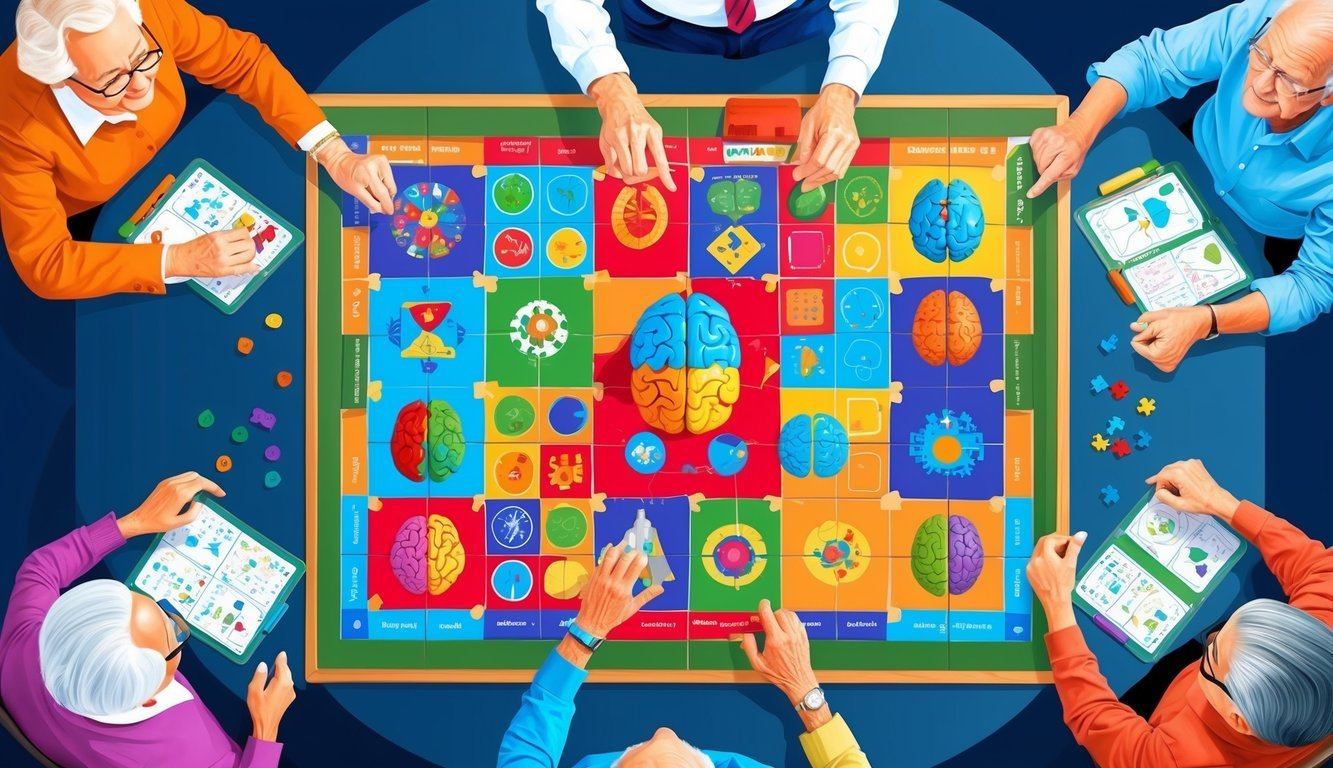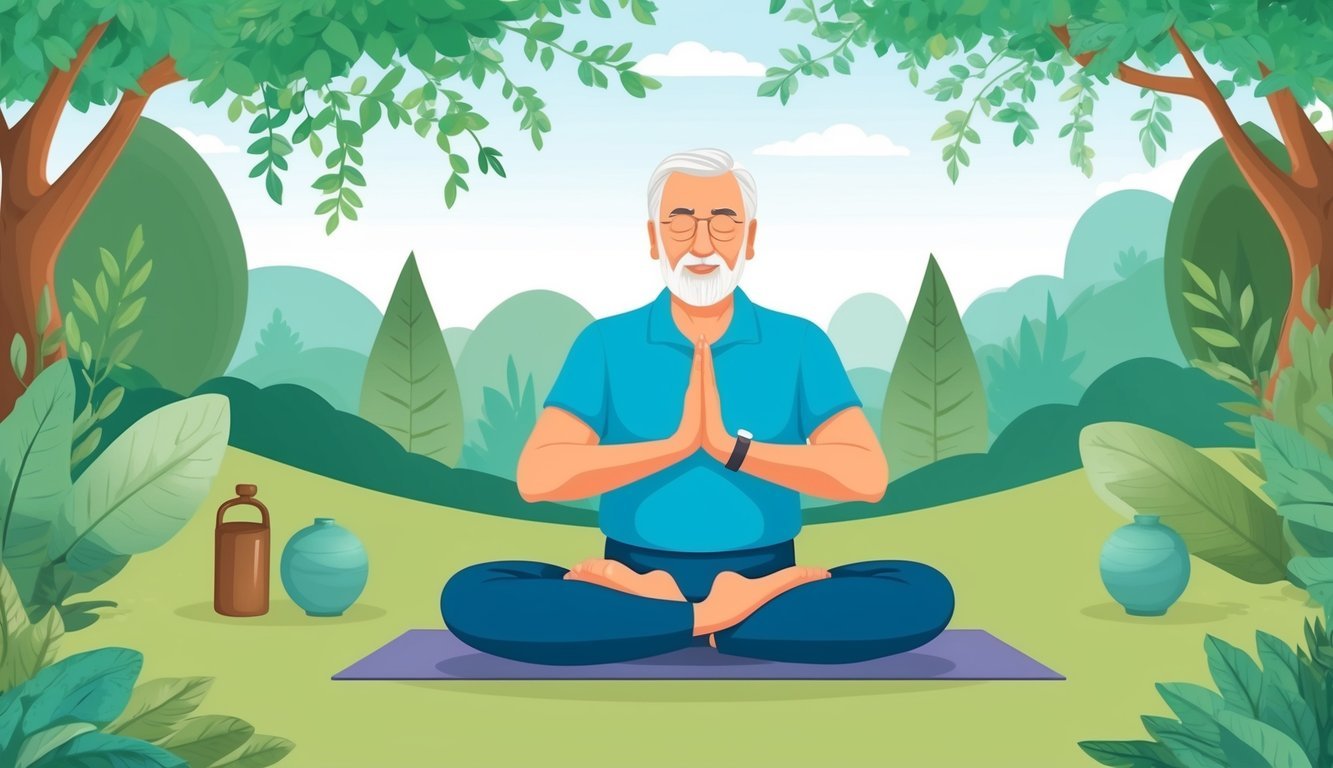As we age, we need to take care of our cognitive health more.
I’ve found that maintaining sharp thinking and improving memory is essential for enjoying a fulfilling life. This article explores 10 essential strategies that can help support cognitive health in seniors.

I believe that embracing healthy habits can really make a difference in our daily lives.
From nutrition to mental exercises, there are various ways to enhance brain function and well-being.
By integrating these strategies, we can work towards keeping our minds active and engaged as we age.
Brain Games: Try BrainHQ

I’ve found that brain games can be a fun way to keep my mind sharp.
One platform I really like is BrainHQ.
It’s filled with exercises specifically designed to boost memory, attention, and decision-making skills.
The idea is that, just like physical exercise, these mental workouts can improve brain health.
The site offers a variety of engaging activities that challenge different cognitive skills.
I appreciate how it provides feedback on my progress, which keeps me motivated.
I also enjoy that these games are backed by research.
They’re designed to promote real changes in brain function, which is encouraging.
Whether I’m tackling puzzles or memory tasks, I feel like I’m actively supporting my cognitive health.
Trying out BrainHQ has not only been enjoyable but also beneficial for my mental agility.
If you’re looking for a way to make cognitive training a regular part of your routine, I recommend giving it a shot.
2) Nutritious Diet: Include Leafy Greens

I often think about how important a nutritious diet is for cognitive health.
Leafy greens are a perfect addition to my meals.
They’re packed with essential nutrients that my brain needs to function well.
Vegetables like kale, spinach, and collards are rich in vitamin K, lutein, and folate.
These nutrients support memory and can even help protect against cognitive decline.
Including just one serving of leafy greens a day could have significant benefits for my brain health.
Adding leafy greens to my diet is easy.
I like tossing them into salads, smoothies, or stir-fries.
They not only boost nutrition but also add flavor and texture to my meals.
Making these changes can be simple yet rewarding.
With the help of these greens, I feel like I’m doing something positive for my body and mind.
It’s a small change that can lead to big benefits over time.
Physical Activity: Walk for 30 Minutes Daily
Incorporating a daily 30-minute walk into my routine has made a noticeable difference in my cognitive health.
Research shows that regular physical activity can boost brain functioning.
I’ve found that walking outdoors does wonders for my attention span and memory.
Walking is an accessible way to engage in moderate-intensity exercise.
I don’t have to do it all at once; breaking it into smaller sessions works too.
It’s not just good for my body; it also refreshes my mind.
I appreciate that even a short stroll can help reduce mental fatigue.
On busy days, stepping out during lunch breaks is my go-to.
The fresh air and movement can turn a sluggish afternoon into a productive one.
Establishing a walking habit feels like a small change with big rewards.
I aim for consistency, and over time, it has become a natural part of my day.
Walking not only supports my physical health but also keeps my mind sharp as I age.
4) Social Interaction: Join a Book Club
I’ve found that joining a book club can be a fantastic way to support cognitive health in seniors.
It’s not just about reading; it’s also about connecting with others who share similar interests.
These clubs offer social engagement, which is key to maintaining mental sharpness.
When I discuss plot twists or characters with fellow members, it sparks lively conversations that keep my mind active.
Book clubs can also provide a sense of routine.
Having a regular meeting gives me something to look forward to each week.
Plus, it’s fun to explore different genres and authors I might not pick up on my own.
Intergenerational book clubs can be especially enriching.
They allow me to connect with younger readers, sharing insights and broadening perspectives.
It’s a win-win for everyone involved.
With options for both in-person and online clubs, it’s easy to find a format that works for me.
No matter the setup, the social interactions and discussions can boost mood and cognitive function, making it a wonderful strategy to support health as we age.
5) Adequate Sleep: Aim for 7-8 Hours

Getting enough sleep is crucial for my cognitive health.
Research suggests that adults should aim for 7-8 hours per night.
It’s during these hours that my brain processes information and forms memories.
I often find that quality sleep improves my mood and helps me feel more focused.
When I don’t get enough rest, I can experience irritability and mental fog.
This makes simple tasks feel more challenging.
Lack of sleep is linked to various health issues, including an increased risk of chronic conditions like heart disease and diabetes.
Understanding this motivates me to prioritize my sleep routine.
Creating a calming bedtime environment is something I’ve found helpful.
I try to go to bed and wake up at the same time each day, even on weekends.
Avoiding screens before bedtime can also make a difference in how well I sleep.
As I aim for those 7-8 hours of sleep, I remind myself that this time isn’t wasted.
It’s an investment in my cognitive function and overall well-being.
Taking care of my sleep is as important as staying active or eating right.
6) Mental Health: Practice Mindfulness Meditation

I’ve found that mindfulness meditation is a simple yet powerful way to boost mental health.
It helps me focus on the present moment, which can be particularly beneficial as we age.
Through mindfulness, I learn to observe my thoughts and feelings without judgment.
This has helped me reduce stress and anxiety.
Research suggests that even short, daily sessions of mindfulness can lead to noticeable improvements.
I enjoy practicing mindfulness meditation for just a few minutes each day.
Techniques like deep breathing or guided meditation can make the process easy.
I often use apps or online videos to help me get started.
Incorporating mindfulness into my routine not only enhances my emotional well-being but also encourages a sense of calm.
As I become more aware of my thoughts, I find it easier to challenge negative patterns.
For anyone looking to improve cognitive health, I recommend giving mindfulness meditation a try.
It’s a gentle approach that fits easily into daily life and can lead to significant benefits.
7) Stay Informed: Enroll in Learning Courses

I’ve found that staying informed through learning courses can really boost cognitive health.
Engaging in new subjects keeps my mind active and helps maintain mental sharpness.
There are many options available, from online courses to local community classes.
I often choose topics that interest me, whether it’s art, history, or technology.
This variety keeps things fresh.
Learning alongside others can also enhance the experience.
Group discussions spark new ideas, and sharing different perspectives helps strengthen that social engagement, which is so important for brain health.
I also enjoy the structured environment that courses provide.
Having set goals keeps me focused and motivated.
Plus, the challenge of learning something new can be rewarding, adding a sense of accomplishment to my routine.
Incorporating learning into my life has truly been beneficial.
It’s not just about keeping information in my head; it’s also about connecting with others and enjoying the journey of discovery.
8) Hydration: Drink Enough Water
Staying hydrated is crucial for everyone, especially seniors.
I’ve learned that being even mildly dehydrated can impact cognitive function.
Water is vital for maintaining the balance of bodily functions.
It helps with circulation, temperature regulation, and nutrient absorption.
I often remind myself to drink water regularly throughout the day.
Research shows that dehydration can lead to cognitive impairments, like memory lapses and decreased attention.
I find that keeping a water bottle nearby encourages me to sip more often.
To make it easier, I sometimes infuse my water with fruits or herbs for flavor.
It’s a simple way to enhance my hydration routine.
Checking my thirst levels is important too.
If I feel thirsty, it’s a sign I need to drink more.
I aim for a steady intake of fluids, particularly during warm weather or when I’m active.
Staying mindful of my hydration not only supports my physical health but also keeps my mind sharp.
It’s a small effort that pays off in many ways.
9) Music Therapy: Listen to Classical Tunes

I’ve always found music to be a powerful tool for relaxation and cognitive engagement.
Classical music, in particular, has a unique ability to enhance emotional well-being.
Its soothing melodies can help regulate emotions and promote a sense of calm.
When I listen to classical tunes, I notice a drop in my stress levels.
Studies show that music impacts various parts of the brain, including those linked to emotion and cognition.
This makes it an effective approach for supporting cognitive health.
Music therapy isn’t just for musicians; it can benefit anyone, especially seniors.
Engaging with music can stimulate memories and improve cognitive functions.
Singing along to familiar classical pieces can also boost mood and enhance mental clarity.
Whether it’s Bach, Mozart, or Beethoven, creating a playlist of classical favorites can be a delightful way to unwind.
I encourage you to explore this soothing strategy.
Your mind and emotions might just thank you for it!
10) Stress Management: Do Yoga Regularly

I’ve found that practicing yoga regularly can really help manage stress.
It’s a great way to unwind and clear my mind.
Yoga combines physical movement with breath control and meditation, which promotes relaxation.
When I engage in yoga, I notice a reduction in my stress levels.
Research shows that yoga can significantly improve well-being and decrease feelings of stress.
It also helps create new connections in the brain that enhance cognitive skills, like memory and learning.
Incorporating just a few minutes of yoga into my daily routine makes a noticeable difference.
Gentle poses can also boost my heart health, which is essential for overall wellness as I age.
I appreciate how yoga supports both my mental and emotional health.
It’s refreshing to take time for myself and focus on my breath.
I encourage anyone looking to enhance their cognitive health to give yoga a try.
It might just become a favorite part of your day.
Understanding Cognitive Health
Cognitive health is crucial for maintaining the ability to think, learn, and remember as we age.
I find that recognizing its importance helps me appreciate the various factors influencing brain function.
Why It Matters
Cognitive health affects daily activities and overall quality of life.
When my cognitive functions are sharp, I can engage more fully in conversations, remember important details, and perform tasks efficiently.
Several factors contribute to cognitive health.
These include genetics, lifestyle choices, and environmental influences.
For seniors, maintaining cognitive health can also significantly lower the risk of developing conditions like dementia.
Here are a few key strategies that I keep in mind for supporting cognitive health:
- Regular exercise: Engages the brain and body.
- Balanced diet: Nutrients play a vital role.
- Mental challenges: Puzzles, reading, or learning new skills stimulate the brain.
Changes with Age
As I grow older, I notice changes in cognitive functions.
It’s common for some cognitive decline to occur, but understanding this helps me take proactive steps.
Aging can lead to slower information processing, decreased attention span, and challenges in recalling memories.
I’ve learned that these changes vary widely among individuals.
Some may experience mild cognitive impairment (MCI), while others maintain sharp cognitive abilities.
To combat cognitive decline, I prioritize:
- Engaging in social activities: Staying connected boosts mental health.
- Continuous learning: Taking classes or picking up new hobbies keeps my mind active.
- Healthy lifestyle: Managing chronic health issues like diabetes or hypertension is important for brain health.
Key Lifestyle Factors
Maintaining cognitive health as we age involves a few essential lifestyle factors that can significantly impact brain function.
Staying active, nurturing social ties, and focusing on nutrition are critical components.
Here’s a closer look at how each one plays a role.
Active Mind and Body
Keeping both my mind and body active is vital for cognitive health.
Engaging in regular physical activity helps boost blood flow to the brain, which can enhance cognitive function.
I aim for at least 150 minutes of moderate exercise each week, like walking or swimming.
Brain exercises are equally important.
Activities such as puzzles, reading, or learning new skills stimulate neural connections.
Combining these helps me maintain both physical and mental sharpness.
The best part? It’s enjoyable and keeps me motivated to stay engaged.
Social Connections
Building and maintaining social connections is crucial for my cognitive well-being.
Research shows that socializing can help mitigate feelings of loneliness, which is linked to cognitive decline.
I make it a point to stay connected with family and friends.
Participating in group activities, such as clubs or classes, not only enhances social skills but also offers mental challenges.
Engaging conversations stimulate my mind and provide emotional support.
Regular interaction creates a community that I rely on for both mental and physical health.
Nutrition’s Role
Nutrition plays an important role in supporting cognitive health.
A balanced diet rich in fruits, vegetables, whole grains, and healthy fats can positively affect brain function.
Foods high in omega-3 fatty acids, like salmon and walnuts, have been linked to improved memory.
I also focus on antioxidants found in berries and dark leafy greens.
Staying hydrated is another key aspect; I always keep water close by.
By choosing brain-healthy foods, I can support my cognitive functions as I age.
This mindful approach to eating helps ensure my brain stays as fit as my body.
In addition to a nutritious diet, incorporating the top supplements for brain health can further enhance memory, focus, and overall cognitive performance.
Nutrients like omega-3 fatty acids, antioxidants, and B vitamins play a crucial role in protecting brain cells and reducing mental decline.
By combining wholesome foods with these key supplements, I can take proactive steps to maintain mental sharpness throughout my life.

